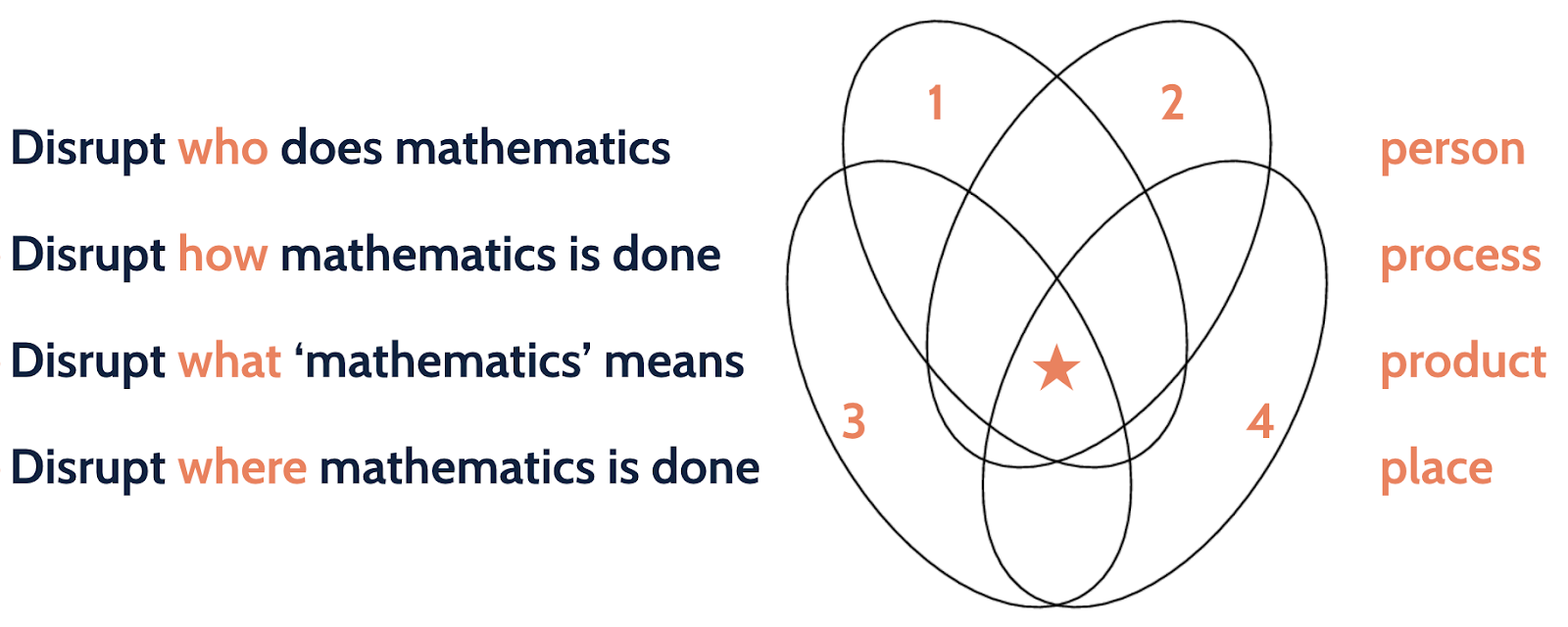|
Hello! My Name is Benjamin.
This is my first week writing for the GMD. Please know that I am open to feedback -- preferably the constructive sort -- and I hope you will consider reaching me on Twitter (@benjamindickman) or email (benjamindickman@gmail.com) if there is something that you believe needs to be highlighted in future newsletters.
TMCNYC19
This past week brought about #TMCNYC19 (not affiliated with TMC) as the Borough of Manhattan Community College kindly provided space for folks to organize and interact around math and math education. The three days of informal workshops and sessions are all listed and linked here - TMCNYC Summer 2019 - and one of the highlights was a #sidewalkmath session led by Brian Palacios (@_b_p) in which participants went out in the Battery Park area of Lower Manhattan to infuse public spaces with accessible mathematics. The general philosophy of sidewalk math, courtesy of Mark Trushkowsky (@mtrushkowsky), can be found in Brian’s slides (along with some great images):

Here is one tweeted example from Eric Appleton (@eappleton) that includes several photographs as well as some videos!

And one more tweet from Nicole Fletcher [@NicoleSFletcher], as the #sidewalkmath continued across the two days after Brian’s presentation:

It is worth noting that the moniker “TMCNYC” is being retired, along with this particular conference, after having had a successful four-year run. If you or someone you know in/around the NYC area would like to be involved in whatever succeeds this particular endeavor, please reach out to Michael Pershan (@mpershan) or other organizers per the starting-fresh-description here (see also its linked blog post):

Nepantla Teachers Community
August also brought the first pair of installments in the Nepantla Teachers Community (@NepantlaTC) blog series.

Before checking out the inaugural two entries, be sure to read over the introduction to these blog posts as it explains logistics as well as norms around how the dual-postings will proceed each month. You can find August links to part one here and to part two here; both are authored by Jerica Pax (@JericaPax), and are entitled: “Pretend That I’m A Cop (Parts I and II)”.
Virtual Conference on Humanizing Mathematics
As a reminder, the #VConHM entries organized by Hema Khodai [@HKhodai] and Sam Shah [@samjshah2] continue; week three is linked here. Read the essays; check out the videos; and see the previous GMD Newsletter or the VConHM entries hosted on Sam’s blog for more. If you haven’t yet seen any of these entries and are looking for one to start with, find the time to read through the powerful piece entitled Unrequited Math Love: A Pakistani Woman’s Numerical Autobiography by Sara Rezvi [@arsinoepi] from Week 1 of the Conference.
Catriona Shearer Geometry Puzzles
For those of you who love geometry puzzles, or someday might, the powerhouse generator of geopuzzles Catriona Shearer (@CShearer41) tweeted a link to a collaborative blog post with loopspace (@mathforge) discussing one of Catriona’s puzzles:

This is not the first time that loopspace and Catriona have collaborated on a blog post; ICYMI earlier in the summer, see also their blog entry here:

Duffin-Schaeffer Conjecture
In other mathematical news, the Duffin-Schaeffer Conjecture from 1941 has had its proof announced by mathematicians James Maynard and Dimitris Koukoulopoulos, the latter of whom tweeted about a relatively readable account in Quanta that was authored by Kevin Hartnett (@KSHartnett):

The article mentions how rational numbers can be used to approximate irrational numbers; for example, the irrational number pi can be approximated by 22/7, and even more accurately by 355/113. The conjecture - potentially now a theorem! - here concerns a more general account of how rationals can approximate irrationals; for Maynard and Koukoulopoulos’ write-up, check out the arXiv pre-print.
Personal Note
As we head into the school year, you can find some of my own developing thoughts about humanizing mathematics in and out of our classrooms in the slides from the closing talk, which I gave, at TMCNYC19. As other pieces are already in motion behind-the-scenes around the “Disrupt” hashtag originally associated with my talk, I would instead invite others to think about sites for intervention or interruption within the following framework:

(Note this is a true 4-Venn! Ellipses were used since it cannot be constructed with circles.)
Check out the full presentation for a host of links to readings, writings, and potential assignments that you might consider incorporating, modifying, and [hopefully!] improving during the upcoming school year: to be used at whatever learning sites or mathematical spaces in which you interact with others around mathematics and mathematics teaching/learning.
Benjamin Dickman
@benjamindickman
|